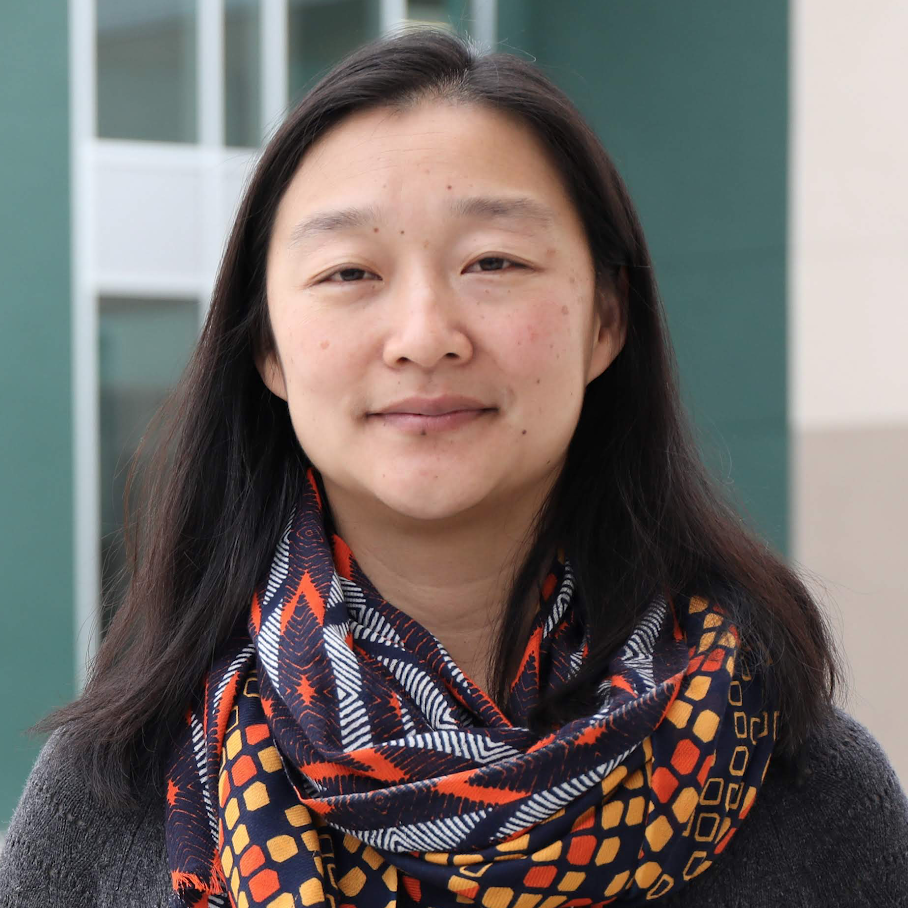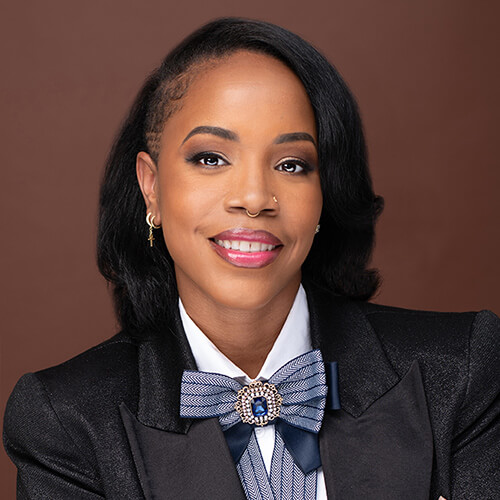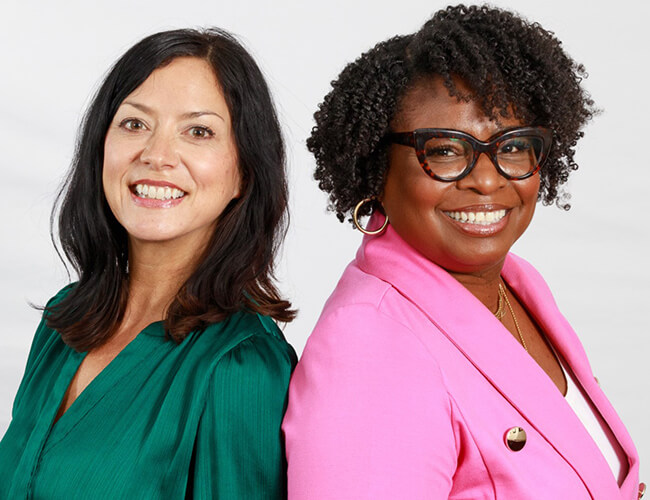As with any relationship, trust is foundational to co-leadership. This came through loud and clear in the origin stories of the leaders taking part in the Bridgespan Co-Leadership Learning Circle. These stories, describing how and why their nonprofits chose co-leadership, demonstrate that building and maintaining trust is a key to success across organizations of all types.
In this first of three articles on what drives co-leadership, six participants describe how trust enabled a new leadership model embraced not only by them but also by their staffs and board members. We hope their stories inspire others curious about co-leadership.
CoGenerate
Organization: CoGenerate’s mission is to bring older and younger people together to solve problems and co-create the future. It invests in social innovators, supports narrative change work, and connects people to each other and opportunities.
Co-Leaders: Marc Freedman, Founder and Co-CEO | Eunice Lin Nichols, Co-CEO
The Path to Co-Leadership
In 2020, after more than two decades serving as CEO of CoGenerate (formerly Encore), Marc Freedman began to think about finding a successor, and Eunice Lin Nichols seemed the perfect candidate. She had joined CoGenerate in 2013 as director of the Purpose Prize, which offered grants to nonprofit leaders over age 50. After three years in that role, she helped move the program to AARP and became the campaign director for CoGenerate’s “Generation to Generation” campaign as well as vice president of innovation. Based on her work in those roles, Freedman knew Eunice had the skills to lead the organization through its next phase.
 Marc Freedman, Co-CEO, CogenerateBut when Freedman approached her about taking on the CEO role, Nichols had another idea—sharing it. “This was a conversation about [wanting] a different kind of leadership,” Nichols says. And it reminded Freedman that a co-leadership approach was in the organization’s DNA. “Our origin is in co-generation: an older and younger person coming together to try to find new ways for the generations to connect in ways that provided mutual benefit and greater impact,” Freedman says. (While in his thirties, Freedman co-founded Encore with John Gardner, former US Secretary of Health, Education, and Welfare, then in his 80s.)
Marc Freedman, Co-CEO, CogenerateBut when Freedman approached her about taking on the CEO role, Nichols had another idea—sharing it. “This was a conversation about [wanting] a different kind of leadership,” Nichols says. And it reminded Freedman that a co-leadership approach was in the organization’s DNA. “Our origin is in co-generation: an older and younger person coming together to try to find new ways for the generations to connect in ways that provided mutual benefit and greater impact,” Freedman says. (While in his thirties, Freedman co-founded Encore with John Gardner, former US Secretary of Health, Education, and Welfare, then in his 80s.)
For Freedman and Nichols, the decision to move toward co-leadership was also about enhancing productivity and creating an opportunity to find more work/life balance, something that Nichols–a mother of two–was looking for in her career. It also gave Freedman a chance to approach the role in a new way. “I began the co-leadership journey in search of a better way to do transition planning since there is no one I trust more with the future of the organization than Eunice,” he says. “But since we’ve been working together, I see this period as a new chapter in leadership, more sustainable for me, and a model for future leadership of the organization.”
Established Trust between Leaders
Nichols and Freedman have served as co-CEOs since 2022, but the work of building and maintaining trust was years in the making.
 Eunice Lin Nichols
Eunice Lin Nichols
Co-CEO, CoGenerate “We’ve worked together so long and know that we can rely on each other,” Freedman says. The trust between the two leaders complements their shared vision and differing work styles. Nichols describes Freedman as a visionary who designs programs that she then can make into a reality. “I think Marc knew that I cared and valued the work as much as him,” Nichols says. “I might do it very differently, but there was a track record and evidence.”
Nichols recognized that co-leading with an organization’s founder could be tricky, but operating under the assumption that each person is working on behalf of the organization with their best intentions is a key to success in this relationship.
“I'm always bowled over by Marc's humility and his desire to be as co-equal as possible, and sometimes that even means pushing me ahead of him, which then brings out the part of me that says, ‘but I also don't want you to be lost and become second,’” Nichols says. “Because this is not, for me, a succession plan. This is a partnership plan.” Freedman concurs: “I feel like we’re making better decisions as the result of more perspective on key questions,” he says.” “And frankly, the job is more fun, and less solitary.”
if, a Foundation for Radical Possibility
Organization: if, a Foundation for Radical Possibility centers the leadership and expertise of Black people and other people of the global majority in the Washington, DC, area. The organization is specifically focused on those who live at the intersections of systems of oppression across race, class, and gender identities.
Co-Leaders: Temi F. Bennett, Co-CEO | Hanh Le, Co-CEO
The Path to Co-Leadership
Temi Bennett and Hanh Le assumed their co-leadership roles in 2022 when their predecessor, Yanique Redwood, stepped down after a decade of leading the organization. During her tenure, Redwood had discussed different leadership models with the organization’s board and staff, including co-leadership. Her departure—and her exit memo—directly encouraged the board to explore shared leadership in some form.
 Temi F. Bennett, Co-CEO
Temi F. Bennett, Co-CEO
if, a Foundation for Radical PossibilityThey didn’t decide specifically on co-leadership, however, until Bennett and Le applied together for the role. Before becoming co-CEOs, Bennett served as the director of policy and Le as vice president of strategic partnerships, and they had already worked together as co-leaders of the foundation’s reparations project. In their application, they made the case that their complementary skills, passion for the organization’s commitment to racial justice, and existing peer relationship could drive the foundation forward.
“This wasn't us applying individually thinking that we might be paired with somebody, or maybe with each other. We applied together because we wanted to work with each other,” Bennett says.
As Bennett, Le, and the board explored the opportunity, they spoke with co-leaders at other organizations. Time and again, they were told that the relationship between the leaders was critical to success. They were off to a good start.
Trust Encourages Vulnerability and Respect Hanh Le, Co-CEO
Hanh Le, Co-CEO
if, a Foundation for Radical PossibilityLeading an organization has its challenges, but starting with a foundation of trust creates a safe space for the inevitable tough conversations. “It takes trust and communication and a willingness to grow, and it also takes a lot of love,” Le says. “I have so much love and respect for Temi, so even if we don't agree on something, or we're bringing different perspectives, the knowledge that the love and respect are there helps get us through any challenging times.”
Their existing relationship also allows Bennett and Le to lean into their strengths while supporting each other. For example, they have collaborated for several years on a major philanthropic reparations project to examine philanthropy’s responsibility for reparations to Black people, Cracks in the Foundation: Philanthropy’s Role in Reparations for Black People in the DMV—a project both found deeply personal and challenging. “For this project to be successful,” Le says, “we needed to trust each other to hold, understand, respect, and care for one another as we collaborated and as we engaged with other partners and stakeholders. This trust was grounded on the trust we already had established in our relationship and has further deepened our trust in one another–creating a virtuous cycle and benefits for all that we do together beyond the project.”
Essential Access Health
Organization: Essential Access Health champions and promotes quality sexual and reproductive health care for all through a wide range of programs and services, including clinic support initiatives, provider trainings, advanced clinical research, advocacy, and consumer awareness.
Co-leaders: Nomsa Khalfani, PhD, Co-CEO | Amy Moy, Co-CEO
The Path to Co-Leadership
In 2022, Essential Access Health experienced a leadership transition when their president and CEO of more than 10 years left the organization. As with many nonprofit organizations, their board faced a fork in the road. Should they conduct an external search for a new CEO or look inside the organization for their next leader? After discussions with its existing leadership team, which included Nomsa Khalfani and Amy Moy, the board determined the women's combined internal expertise, complementary skill sets, and personal backgrounds made them the right co-leaders to guide the next phase of expansion and impact for the organization. The board also decided that it was essential for the leadership transition to reflect and align with the organization’s commitment to fostering a culture of inclusion and empowerment.
 Co-CEO's Amy Moy and Nomsa Khalfani
Co-CEO's Amy Moy and Nomsa Khalfani
Essential Access HealthA quote from Nina Kjellson, Essential’s board chairwoman, in the board’s announcement of the transition summed up the thinking and demonstrated its trust in the pair: “The co-CEO model represents the board’s confidence in Nomsa’s and Amy’s capabilities and shared leadership vision and aligns with the culture of inclusion and empowerment we want to foster internally and catalyze externally at this critical juncture in sexual and reproductive health. We have a diverse and exceptionally dedicated and capable team at Essential Access, and it feels only right that our ‘new’ leadership arises from—and represents—that diversity and talent.”
Extending Trust beyond Co-Leaders
“Co-leadership can’t happen if there’s no trust,” Khalfani says. “Otherwise, it’s really putting two people together with the hope that they can create synergy, create excitement, and drive work forward in an organization.” But while Khalfani and Moy already had trust, their new roles required deepening it. “What does it mean to create a new trusting relationship between us in this new capacity?” Khalfani adds. “I think there was a respect for each other, which opened the door to create even more trust in that. We knew we had each other’s back. We were partners in this process.”
“Trust is an evolution and a revolution,” Moy says. “You know it has to be in existence, and strong and present from the beginning, and it’s something to keep nurturing and cultivating.”

